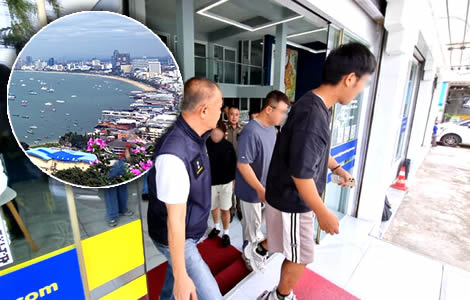Three Chinese workers were arrested in a Pattaya real estate raid amid a crackdown on illegal foreign businesses. Following the March 28 earthquake in Bangkok, property interest surged in Pattaya. New tax rules aim to attract overseas funds, boosting local investment further.
A police operation in Pattaya on Monday targeted a major Chinese property brokerage firm. Three individuals were arrested. However, officials are now examining company records as part of a broader crackdown on Chinese economic infiltration and the illegal use of nominee shareholders in Thai firms. The development comes amid a sharp surge in property investment in Pattaya following the March 28th earthquake in Bangkok. That quake severely shook confidence in the capital’s safety, and its aftereffects are still being felt. Meanwhile, on the same day, a senior property industry figure welcomed a new regulation from the Revenue Department. The new rule exempts repatriated income from tax for up to two years, aiming to attract overseas funds back into the Thai economy.

Thai police raided a Chinese-run real estate office in Pattaya on Monday, arresting three Chinese nationals for working illegally. The operation was carried out by officers from Regional Police Investigation Division 2. It is part of a sweeping crackdown on foreign businesses suspected of skirting Thai laws.
The raid took place in the Nong Prue Sub-district, Bang Lamung District, Chonburi Province. The building was registered as a property agency but catered almost exclusively to Chinese clients. Inside, officers found 16 Chinese staff members and around 30 Chinese customers waiting for service.
Chinese-run property firm accused of brokering sales illegally and using Thai nominee as cover owner
The company marketed itself as a consultancy for Chinese nationals buying property in Pattaya. However, police believe the firm acted as an unlicensed broker. It helped foreigners acquire homes, condominiums, and even land, despite strict ownership limits under Thai law.
Three of the 16 Chinese staff members—two men and one woman—were working without valid permits. They were arrested immediately. Authorities are now investigating whether more employees lacked documentation. The suspects are expected to face criminal charges for working without permission.
Police also summoned a Thai national listed as a company shareholder. He was identified only as Mr. Kham, 40, from Wiang Kaen District in Chiang Rai. Investigators believe he may be a nominee, holding shares on behalf of the real Chinese owners.
Under Thai law, foreigners are barred from owning most types of businesses directly. Many use Thai proxies to mask real ownership. This tactic, known as nominee structuring, is illegal but remains widespread. However, the government is now cracking down.
Investigation expands as officials examine financial records for possible breaches of Thai business laws
Police confirmed that the firm is under further investigation for potential violations of the Foreign Business Act. Financial transactions and shareholder records are being examined closely. The raid is likely the first of several in the region.
Authorities say the Pattaya firm is part of a broader pattern. Chinese-linked businesses are increasingly accused of operating in Thailand’s grey economy. These firms often use legal loopholes to hide real ownership and launder money.
Senior police and regulatory sources say Thailand welcomes foreign investment. However, they warn that rules must be followed. The crackdown aims to separate legitimate investors from those abusing the system.
Interest in Pattaya real estate has surged since the 7.7-magnitude earthquake that struck near Bangkok on March 28. That quake rattled confidence in the capital’s safety. One building under construction collapsed. Others were declared unsafe pending inspection. The collapsed building is believed to have had structural design weaknesses in its elevator shaft.
As a result, many investors began eyeing coastal areas like Pattaya. Unlike Bangkok, Pattaya lies outside Thailand’s seismic fault zones. It has now become a magnet for property buyers seeking safer ground.
Earthquake fears shift investment away from Bangkok and towards safer coastal real estate in Pattaya
Many of these new buyers are Chinese nationals. Some seek second homes. Others want permanent relocation or investment properties. Pattaya’s appeal has grown sharply in 2025, especially after the earthquake disruption impacting the Bangkok’s property market.
Engineers have issued strong warnings about future seismic risks. Bangkok sits on soft soil prone to movement during tremors. Moreover, much of its infrastructure is ageing. The city is now facing a shortage of structural engineers and elevator technicians. That comes with more inspections of buildings and minor repairs particularly focused on elevator shafts in substantial buildings.
Thousands of buildings are under inspection. Emergency maintenance teams are stretched thin. Property values in the capital have flattened or declined in some areas. Buyers are now looking eastward, and Pattaya is reaping the benefits.
Colliers Thailand and the Chonburi Real Estate Association reported a 20% jump in foreign purchases this year. The trend is expected to continue through the second half of 2025. Chinese demand remains dominant.
Chinese investment in Pattaya accelerates with a focus on condominiums and industrial areas near Rayong
Watthanapol Polcheewin, President of the Chonburi Real Estate Association, says most Chinese purchases fall in the ฿2–4 million range. Buyers typically target condominiums in North, Central, and South Pattaya. Foreigners may legally own up to 49% of units in each project.
He adds that China’s economic shifts are driving outbound investment. The lingering effects of the U.S.–China trade war have pushed investors to diversify. Many are buying Thai property, especially near industrial zones in Chonburi and Rayong.
Some are also acquiring land for factories, using complex legal workarounds. Officials say this activity is often disguised as legitimate enterprise. However, several of these businesses are now under review.
Meanwhile, Thai regulators are also encouraging legal inflows of capital. At the same time, the Ministry of Finance has proposed a new tax measure. The plan would allow Thai tax residents to bring home overseas income-tax-free for two years.
New tax rule could unlock 2 trillion baht in offshore funds as property sector eyes cash inflow boost
Issara Boonyang, Chairman of the Real Estate, Design and Construction Business Association, supports the move. He said it would help repatriate an estimated ฿2 trillion held overseas by Thai nationals. That money could then be invested in land, insurance, or other Thai assets.
Currently, only income brought into Thailand in the same year is taxed. Many Thai investors keep funds abroad to avoid that liability. Extending the exemption to two years would change that behaviour, Issara said.
He also noted the policy could indirectly boost the real estate sector. More liquidity would likely lead to more purchases. However, clarity is still needed. The Revenue Department has not confirmed whether foreign residents living in Thailand will benefit.
Officials say the policy will follow OECD principles, which stress fairness and non-discrimination. Full guidelines are expected when the regulation is published later this year.
Further raids are likely as officials vow to crack down on proxy ownership in real estate and other sectors
In the meantime, enforcement efforts will intensify. Authorities plan more inspections of businesses suspected of nominee ownership. The Pattaya raid is seen as a test case. Results will likely influence how regulators proceed with other suspected grey operations.
Police sources say more real estate firms are already being monitored. Several face possible raids in the coming weeks. Investigators are focusing on areas with high concentrations of Chinese-owned businesses.
Tourism minister orders all Bangkok hotels surveyed as this Friday’s shocking Earthquake fallout mounts
Flights are normal, building codes worked but will be checked as fears rise for workmen. PM briefs public
Thai Revenue planning new decree making remitted foreign funds within one year tax-free for residents
Thailand is trying to walk a fine line—welcoming investment while preserving legal order. Officials want real capital, not hidden money. Monday’s arrest sends a clear signal. Loopholes and a blind eye will no longer be tolerated.
Join the Thai News forum, follow Thai Examiner on Facebook here
Receive all our stories as they come out on Telegram here
Follow Thai Examiner here
Further reading:
With an economy in the doldrums, the Finance Ministry is still pursuing a higher tax take regime
55% of Foreign Expats thought of moving out of Thailand in 2024. Majority will not file tax returns
End of the road proposed for Thailand’s ‘Happy go-Lucky’ Economy in Paetongtarn’s Policy Statement
Revenue Department preparing legislation as new Expat tax regime may link visas and tax returns


















